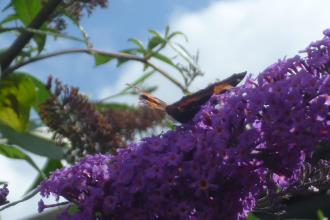On behalf of JPIC (the Justice, Peace & Integrity of Creation group), Associate Member Charles Jolly offers this month's update:
Do not see bad ecological news, only opportunity to do good! Where have all the butterflies gone?
Those of us who have been driving for 60 or 70 years surely remember wind-screens covered with the remains of unfortunate flies and bees. No more. The drastic decline in their numbers is less a result of more cars but has largely been caused by a loss of habitats, the wide use of pesticides and to some extent by climate change. Now a 'Butterfly Emergency' has been declared by the charity 'Butterfly Conservation', which works to protect butterflies, moths and their habitats across the UK.
The figures are alarming: some 85,000 volunteers recorded 935,000 butterflies and day-flying moths over 3 weeks from 12th July, which is down almost 600,000 from 2023.

One butterfly bucked the trend: the Red Admiral, which saw an increase of 28% in a 14 year trend. One sunny day we spotted a specimen on the buddleia so I quickly snapped it! Sadly, other butterflies are down by up to 65%. The worst culprits are almost certainly neonicotinoids. These insecticides were banned across the EU and UK in 2018 but the UK government has since allowed them to be used on sugar beet. What seems to happen is that the chemicals get into wild plants at the field edges and butterflies and moths then are contaminated from nectar in the flowers and caterpillars from eating the leaves.
To sign Butterfly Conservation’s letter to the Government asking them to declare a ‘Nature Emergency’ and ban butterfly-killing neonicotinoid pesticides visit: https://butterfly-conservation.org/emergency
And here is some news to cheer about: Ripple Effect
For 36 years, the charity 'Ripple Effect' has been working alongside farming families in East Africa so that they can grow a brighter future, fighting hunger and the climate crisis. The biggest challenge faced by farmers in rural Africa is climate change. They are losing crops and food supply to drought and flooding. Once families are trained in farming more sustainably, adapting positively to climate change and developing business skills they can be helped to invest in their farms, find reliable markets and thus become more resilient. The key to the charity's remarkable success is that as families become more secure, peer farmers start a ripple effect by sharing their knowledge. Like Chantal:
Chantal lives in Rwanda with her husband and three children. She is now growing a greater variety of foods, providing a balanced diet to her family, and selling the rest to her local community. She also enjoys sharing her knowledge with other farmers, creating her own ripple effect.
"My neighbours keep coming to learn from me, and it is good, because this is how we support each other to develop.” "There's a lot to be thankful for...my children are fed, and healthy. I feel so happy and grateful."
There are many synergies with Eco Church! For example: we can adapt some African- designed solutions, support Ripple Effect at Creation Time, Harvest, Christmas & Lent or become a Mission Partner and support the work in rural Africa. If you've already twinned your toilets and if your church has a garden, why not twin it with an African farm for £120?
For more information go to: www.rippleeffect.org
or contact Ann Hatton, the community manager: ann.hatton@rippleeffect.org
If you have any questions or observations please contact: charles.jolly13@btopenworld.com